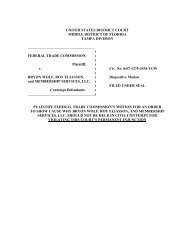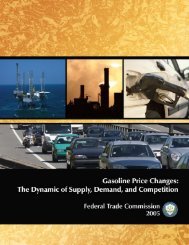Complaint Counsel's Post Trial Brief - Federal Trade Commission
Complaint Counsel's Post Trial Brief - Federal Trade Commission
Complaint Counsel's Post Trial Brief - Federal Trade Commission
Create successful ePaper yourself
Turn your PDF publications into a flip-book with our unique Google optimized e-Paper software.
262. When enterng in the MA an activity for an herb, Duke only enters references to that<br />
source "as it may be a good source ( or) it may be a bad source." (R 18 (Duke, Dep. at<br />
93)).<br />
263. Duke acknowledged that it is a "gut feeling" on how he makes sure that the studies he<br />
references in the MAs are reliable. (R18 (Duke, Dep. at 108)).<br />
264. Duke acknowledged that his MAs have not been cited in any peer-reviewed joural.<br />
(R18 (Duke, Dep. at 113)).<br />
265. Duke explained that his Indication Evaluations ("IE") is where he has "gone though all<br />
these abstracts over the years (and) I've scored for a given indication. If it's folkore and<br />
that's all I have, it would receive an 't; ifit has a chemcal or an epidemiological or an<br />
anal or an in vitro evidence, I've given it a 1; and then the 2, as we mentioned earlier,<br />
that means it's either been clincally approved - - an extract of the plant has been<br />
clincally approved or it's been approved by the Commssion E or the Traml<br />
Commssion for that indication. These are lines of evidence that point to me which ones<br />
are most important and should be studied for cancer." (R18 (Duke, Dep. at 59, 118-19)).<br />
266. The IE is a "compendium of information." (R18 (Duke, Dep. at 109); Duke, Tr. 526).<br />
267. There is no relationship between the MAs and the IE. (R18 (Duke, Dep. at 92)).<br />
268. Neither the MAs nor the IE reflect information that indicates that tuerc, for<br />
example, is effective in the treatment of cancer. (R18 (Duke, Dep. at 109-10)).<br />
269. Duke has never measured the effcacy of herbs as a treatment for cancer in a controlled<br />
patient population. (R18 (Duke, Dep. at 55)).<br />
270. Duke is not able to express opinons on what the minium dosage would be necessar to<br />
achieve cancer-fighting. (R18 (Duke, Dep. at 67-68); Duke, Tr. 522-23).<br />
271. Duke recognzes the difference between somethg being effcacious in an in vitro study<br />
and somethg being effcacious in human beings. (R18 (Duke, Dep. at 71); Duke, Tr.<br />
523).<br />
272. As a matter of science, Duke does not believe that the herbal extract working in vitro<br />
proves that it would work in a human. (R18 (Duke, Dep. at 77); Duke, Tr. 523).<br />
273. Rather than relyig solely on in vitro studies, Duke recommends "the third ar-tral<br />
where the whole plant or an extract thereof is compared with a competing<br />
pharaceutical." (R18 (Duke, Dep. at 77)).<br />
274. According to Duke, "(t)he thrd ar would compare a given herb with a given<br />
pharaceutical and placebo." (R18 (Duke, Dep. at 81)).<br />
275. Other than the St. John's Wort tral that used a placebo and Zoloft, Duke is not aware of<br />
any other studies where an herb, a pharaceutical, and a placebo were studied in a sideby-side<br />
maner. (R18 (Duke, Dep. at 82)).<br />
26

















